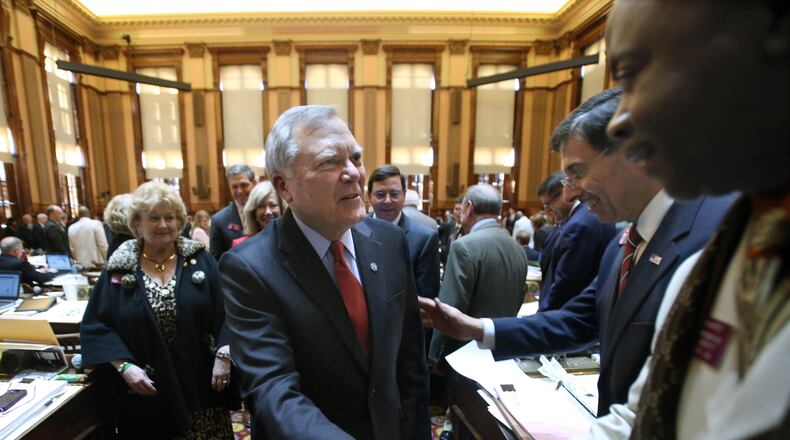Politics drives every legislative session despite the altruistic rhetoric you may hear from lawmakers. But with a record-early primary contest and wild races for Georgia’s top offices coming, the partisan gamesmanship will loom larger than ever when the 40-day session begins Monday.
Prominent lawmakers in both chambers are seeking higher office and will use their seats to amplify their policy positions. Rifts ranging from education funding formulas to firearms rights will sharpen the political divide. And Gov. Nathan Deal will face greater scrutiny as three rivals look to exploit any missteps.
The political jockeying will be a constant undercurrent during the next few months. It will factor into debate over the state’s spending priorities. It will make an impact on a push for teacher pay raises and a drive for more local control over school districts. It will even affect the timing of the session, as lawmakers hope to ditch the Capitol to prepare for primaries that will likely be set for May 20.
“You’re going to hear a lot more noise and a lot more posturing,” said Bill Crane, a political analyst and commentator. “In many senses, Atlanta will be more like Washington this year, with a shorter campaign cycle and a process that could even be further politicized.”
In essence, he said, “the yelling will be even louder.”
Deal vs. Carter
And the most intriguing spectacle may be the maneuvering between Deal and state Sen. Jason Carter, the Atlanta Democrat seeking to oust him from office. Carter offered scant details on his legislative proposals, but expect him to use the pulpit of his Senate seat as an incubator for an education platform as he tries to draw contrasts with the incumbent.
"I have been talking about education since I was elected," said Carter, who has pushed changes to restore an income cap on HOPE scholarship eligibility. "And that's a message that's been resonating with lots of people."
Deal and his staffers are taking a different tack. He and his aides are trying to influence legislation — quietly and not so quietly — to ensure he’s not put in a compromising bind over a wedge issue that could alienate supporters or turn off independent voters.
He’s taken an avowedly neutral stance on a contentious bid to overhaul the medical malpractice system that has polarized groups representing lawyers and doctors. He’s opted not to back more sweeping changes to the criminal justice code, instead preferring a more scaled-back approach to reducing recidivism.
And perhaps most importantly, he’s tried to ration the typical election-year glut of tax break proposals by requiring they be vetted by a committee he organized. Deal has said repeatedly in the run-up to the session that he doesn’t expect a broader tax overhaul this year, despite a push from tea party groups to make more significant changes.
"I have asked the members of the General Assembly to hopefully refrain from any major tax measures this year," Deal said at a GOP gathering, citing the recent phase-out of the sales tax on energy used in manufacturing and a broader agricultural tax break. "We still don't know the bigger scope of how these changes will shake out."
That leaves him freer to pursue an agenda focused on education, which is certain to be a constant theme of the 2014 election. The governor this week is expected to propose sending extra money from growing state coffers to school districts, which administrators could use to cut furlough days or give teachers a raise ranging from 2 percent to 3 percent.
Deal’s two Republican rivals will be eager to strike a contrast. Expect Dalton Mayor David Pennington to support tightening ethics rules and pressure Deal to slash taxes. And schools Superintendent John Barge recently welcomed legislators to Atlanta with a reminder of the “dire” impact that education funding cuts have had on rural schools.
"Quite frankly, I think the rest of the state should understand that our rural, agrarian communities are producing the food we eat and the fiber that is turned into the clothes we wear," he said in his letter to legislators and Deal. "We cannot afford to do without them."
Widespread jockeying
The same gamesmanship will reverberate throughout the Gold Dome, where lawmakers are trying to keep their jobs or rise to higher office. Legislators seeking promotions often step down to raise cash because they’re barred from fundraising during the session.
But state Rep. Ed Lindsey, who like Carter opted to stay in office, said he’s confident the legislative session won’t transform into a political spectacle. After all, he said, every two years one legislator or another makes the same decision to stay in office.
“We’ve seen this happen before,” said Lindsey, a Republican seeking an open U.S. House seat. “I’ve generally been taught that the best way to get the job you want is to do well at the job you have now. And that’s my goal.”
Capitol veterans look at it a different way. Jim Kulstad, a longtime lobbyist who’s seen plenty of political posturing during his decades under the Dome, had only this advice: The statehouse could soon resemble a spin cycle.
“We’re going to be hearing a lot of campaign speeches out there.”
About the Author
Keep Reading
The Latest
Featured




